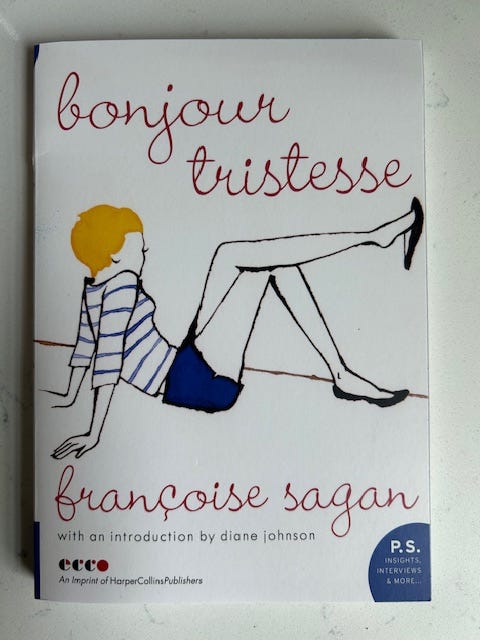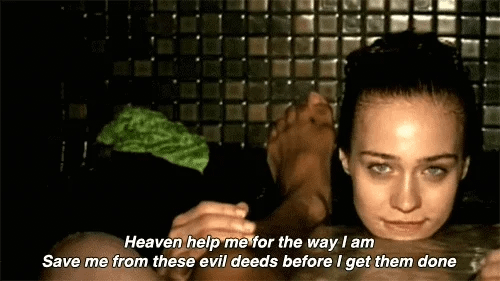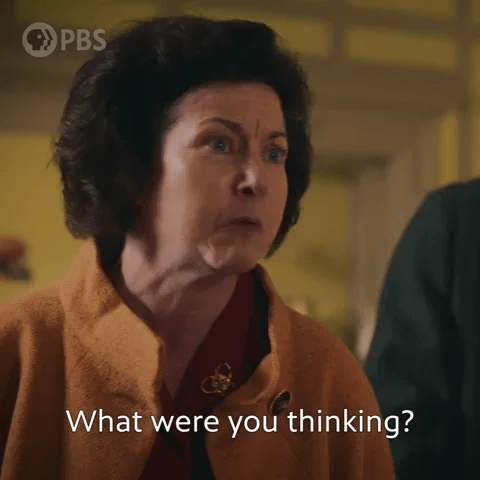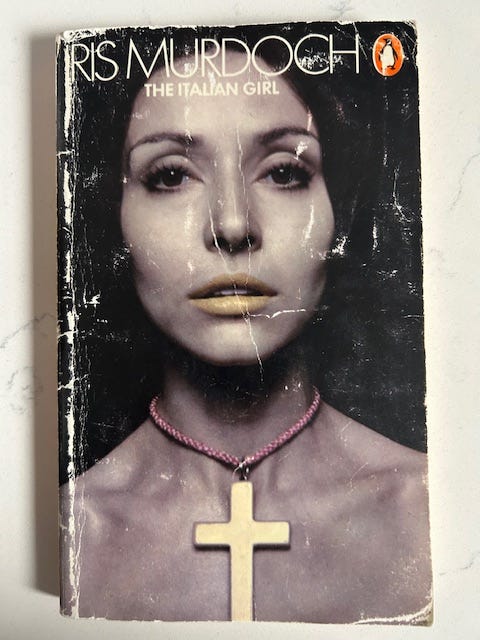'Bonjour Tristesse' by Françoise Sagan
'That summer returns to me with all its memories.'—Review #238

Though written decades ago, Françoise Sagan’s novel ‘Bonjour Tristesse’ is a cautionary tale about what can happen when brat summer goes too far. ‘Brat,’ in this case, draws from both the traditional definition of the word and Charlie XCX’s recent coinage as the story follows a young and spoiled teenage girl who spends a summer on the French Riviera making bad decisions and getting into all sorts of drama.
Here’s the book’s cover:

Cécile is 17 and lives a carefree life in Paris with her wealthy father, Raymond, after years spent at a convent school. Raymond is a 40-year-old widower and successful businessman who enjoys an endless parade of mistresses. As the novel opens, he has rented a house with a private cove on the southern coast of France where he, Cécile and his latest young-lady friend, Elsa, intend to spend the summer swimming, sunning and relaxing. Soon after they arrive at the vacation house, Raymond informs Cécile and Elsa that another woman is coming to join them. Anne, a beautiful and strong-willed friend of Cécile’s late mother, was apparently in need of a vacation and, when Raymond extended an off-the-cuff invitation, she accepted. Cécile sees trouble immediately. How are Elsa and Anne going to get along? How will Anne, who briefly filled in as a motherly presence years earlier, interfere with Cécile’s summer plans? Will she push her to study for college entrance exams and read boring philosophy? Will she force her to stay away from Cyril, the cute twenty-something law student with a cool boat who lives down the beach? She says to her father:
Anne arrives in her big car, and tensions rise. Elsa is jealous and lords her romantic relationship with Raymond and her youth over Anne, who’s older, elegant and more sophisticated. Cécile is forced to limit her beach time and crack those philosophy books after Anne learns the teen bombed her exams and hasn’t been studying. Anne also learns about Cyril, and warns Cécile not to get too involved with him. One night, Raymond, his daughter and the two women go to the casino at Cannes. When Raymond and Anne disappear, Elsa and Cécile search for them—annoyed. Cécile finds the pair having an intense conversation. They tell her they’re going back to the house, and that she should go find Elsa and come home with her later. Cécile is shocked, and after she relays a sanitized version of this story to Elsa, the mistress storms off. The following morning, Raymond and Anne tell Cécile they plan to marry. Cécile’s shock escalates into distress. She had enjoyed her freedom with her father, who was more of a drinking buddy than a parent or taskmaster. Anne’s presence will change her home forever, restrict her. Cécile’s like:

She crafts a plot to break up the new couple that involves Elsa and Cyril. Although Cyril is madly in love with Cécile (and they’ve been having a secret liaison), she instructs him to pose as Elsa’s new lover. The two of them are to take Cyril’s boat and casually cruise past Cécile’s villa’s cove where her father can see them. The sight of the young couple will ignite Raymond’s jealousy and vanity; he’ll dump Anne to get Elsa back. While plotting, Cécile grapples with inner turmoil. On the one hand, she wants to be rid of Anne and her impending discipline. On the other, she knows she’s being irrational and ridiculous: Anne is a good person who would be a positive influence both on her and her father. Hmm, on second thought, perhaps Cécile has less Charlie XCX energy and more Fiona Apple ‘Criminal’ energy:

Cécile narrates this story several years after the events of that summer and the serious consequences that resulted from her actions. I won’t give it away, but the outcome is unexpected and haunting. It had me like:
I greatly enjoyed ‘Bonjour Tristesse.’ Sagan’s writing is crisp and sharp, and I flew through it. I love that Sagan was only 18 when she wrote this book, not much older than her protagonist, and that she was able to give Cécile a fascinating and complex interior life. I was riveted to her journey—you guys know I love stories full of drama and gossip. And I love the telling details Sagan wove into the narrative. For example, red-headed Elsa constantly struggles with sunburn on her fair skin, unlike Raymond and Cécile who tan easily. It’s a subtle way to show she’s an outsider, an interloper. (I felt bad for Elsa because I am similarly allergic to sunshine.) ‘Bonjour Tristesse’ is a perfect novel to read in August. Of course, it’s set in summer and, at just 130 pages, it fits our theme for a short-book season. But August is also Women in Translation month. So if you’re looking for translated fiction that’s also a quick read suited for a late-summer break, be sure to check out this book. I highly recommend it.
An opening excerpt:
A strange melancholy pervades me to which I hesitate to give the grave and beautiful name of sorrow. The idea of sorrow has always appealed to me, but now I am almost ashamed of its complete egoism. I have known boredom, regret, and occasionally remorse, but never sorrow. Today it envelops me like a silken web, enervating and soft, and sets me apart from everybody else.
That summer, I was seventeen and perfectly happy. At that time “everybody else” was my father and his mistress, Elsa. I must explain this situation at once, or it might give a false impression. My father was forty, and had been a widower for fifteen years. He was young for his age, full of vitality and liveliness. When I left my convent school two years before and came to Paris to live with him, I soon realized that he was living with a woman. But I was slower in accepting the fact that his fancy changed every six months! But gradually his charm, my new easy life, and my own disposition, led me to fall in readily with his ways. He was a frivolous man, clever at business, always curious, quickly bored, and very attractive to women. It was easy for me to love him, for he was kind, generous, gay and fond of me. I cannot imagine a better or a more amusing companion. At the beginning of the summer I am concerned with now, he even asked me whether I would object to having Elsa along on our summer vacation. She was his mistress of the moment, a tall, red-headed girl, sensual and worldly, kindly, rather simple-minded, and unpretentious. One might have come across her any day in the studios and bars of the Champs-Elysées. I readily consented, for I knew his need of a woman, and I knew, too, that Elsa would not get in our way. Besides, my father and I were so delighted at the prospect of going away that I was in no mood to object to anything. He had rented a large white villa on the Mediterranean, for which we had been longing since the spring. It was remote and beautiful, standing on a headland jutting over the sea, hidden from the road by pine woods. A goat path led down to a small, sunny cove where the sea lapped against rust-colored rocks.
My rating:

‘Bonjour Tristesse’ by Françoise Sagan was originally published in English by E.P. Dutton & Co. in 1955. Translated from the French by Irene Ash. It was published by Ecco in 2001. 130 pages. $15.81 at Bookshop.org.
What’s next:
Next week, we’ll host a discussion thread. The following week’s newsletter will feature a roundup of random books I read this summer, including the one you chose in last week’s poll:
Before you go:
ICYMI: Review #237
See this: Just as I was finalizing this newsletter, I saw an Instagram post about a 1958 film adaptation of ‘Bonjour Tristesse’ directed by Otto Preminger that starred Jean Seberg as Cécile, David Niven as Raymond and Deborah Kerr as Anne. The post also mentioned a forthcoming adaptation due to be released next month starring Chloë Sevigny as Anne, Claes Bang as Raymond and Lily McInerny as Cécile and directed by Durga Chew-Bose. (Side note: I feel like I see the striking cover of Chew-Bose’s essay collection ‘Too Much and Not in the Mood’ on the staff picks shelf of the Strand every time I’m there.) I had no idea there were any adaptations of this book, let alone two! I need to see each of them.
Read this: Eater has a terrific roundup of book-themed bars that have opened recently across New York City. I want to check them all out, starting with Liz’s Book Bar on Smith Street in Brooklyn, not far from where we live. This is an exciting trend!
Read this, too: I love Patsy Cline’s music, but I didn’t know much about her life, or her dog named Pepe, until I read this fascinating installment of Art Dogs. It’s one of my favorite newsletters, and it’s about artists and their pets.
If you enjoyed this review:
Thanks for reading, and thanks especially to Donna for editing this newsletter!
Until next time,
MPV











I've seen the Seberg film -- it's good. "Brat summer goes too far" describes the story perfectly!
I never knew what this novel was about but always thought it had a sad-sexy title—Fiona Apple all the way